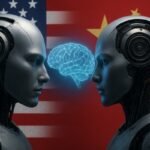Artificial intelligence is no longer a distant concept reserved for tech enthusiasts. It has firmly entered workplaces, transforming how tasks are performed, how decisions are made, and how teams collaborate. The adoption of AI tools for business is driving significant changes across industries, bringing both opportunities and challenges. Employees are adapting, businesses are evolving, and the demand for reskilling for AI is at an all-time high.
AI Is Changing the Workplace at Every Level
AI is not just about automation. It is about enabling businesses to work smarter, faster, and with greater precision. From streamlining administrative tasks to offering deep insights into customer behavior, the use of AI in modern workplaces is expanding rapidly. According to industry reports, companies that integrate AI into their processes see higher efficiency and reduced operational costs.
The Rise of AI Automation Jobs
Automation once meant machines replacing manual labor in factories. Now, it includes software solutions taking over data entry, scheduling, and analytics. The growth of AI automation jobs shows how roles are evolving employees are moving away from repetitive tasks toward creative and strategic responsibilities.
Why Businesses Are Investing in AI
Companies view AI not just as a technological advantage but as a necessity to stay competitive. Some of the biggest drivers include:
- Efficiency and Accuracy
AI processes data with minimal errors, saving time and reducing operational risks. - Customer Experience Enhancement
AI-powered chat systems, predictive personalization, and automated support improve satisfaction and brand loyalty. - Market Analysis and Forecasting
AI tools analyze consumer trends, helping companies make informed decisions about product launches and marketing strategies.
By adopting the right AI tools for business, organizations are streamlining operations while opening new growth opportunities.
The Human Side of AI – Reskilling Is Essential
The integration of AI has raised concerns about job security. However, research shows that while AI may replace certain roles, it also creates new opportunities. The key lies in reskilling for AI developing capabilities that complement, rather than compete with, automation.
Workers are encouraged to focus on skills like:
- Strategic thinking
- Emotional intelligence
- Problem-solving in complex, real-world contexts
- Tech literacy for AI-related tools
Organizations are also building in-house training programs to prepare their workforce for this transition.
Industries Leading the AI Transformation
AI is not confined to one sector. It is rapidly shaping multiple industries:
- Healthcare – AI assists with early diagnosis, personalized treatment plans, and managing patient data efficiently.
- Finance – AI is used for fraud detection, credit risk assessment, and real-time financial insights.
- Retail & E-commerce – AI-driven inventory management, predictive analytics, and recommendation engines improve customer experience.
- Government & Policy – Policymakers like [Gavin Newsom: California’s 40th Governor and His Story] are also exploring AI frameworks to support ethical innovation.
Adapting to the AI-Powered Future
For businesses, the question is no longer whether to integrate AI but how to do so strategically. For employees, staying relevant means learning to collaborate with AI rather than fear its impact.
- Upskilling Programs – Businesses are investing in training to prepare staff for AI-driven roles.
- Collaborative Workflows – AI is best used as a supportive tool, not a replacement.
- Continuous Learning – Staying informed about AI developments ensures long-term growth.
Final Thoughts
AI is not replacing the workforce, it is reshaping it. Those who adapt, embrace AI automation jobs, and prioritize reskilling for AI will thrive in this evolving landscape. Businesses that leverage AI tools for business effectively will stay ahead, driving innovation and efficiency across industries.








